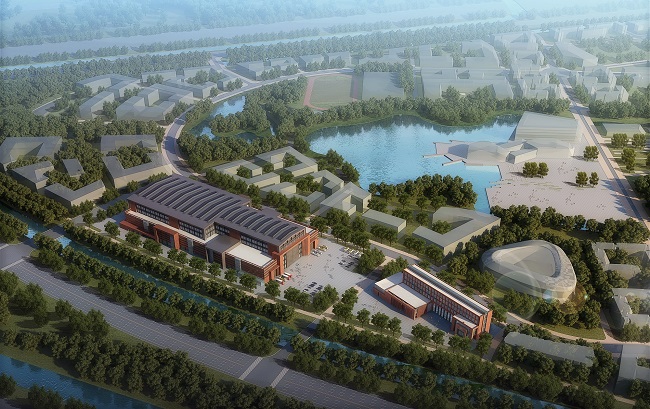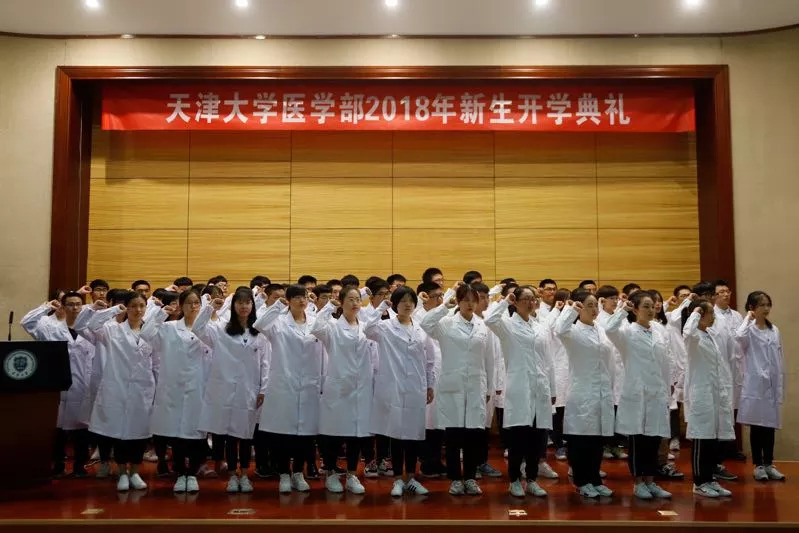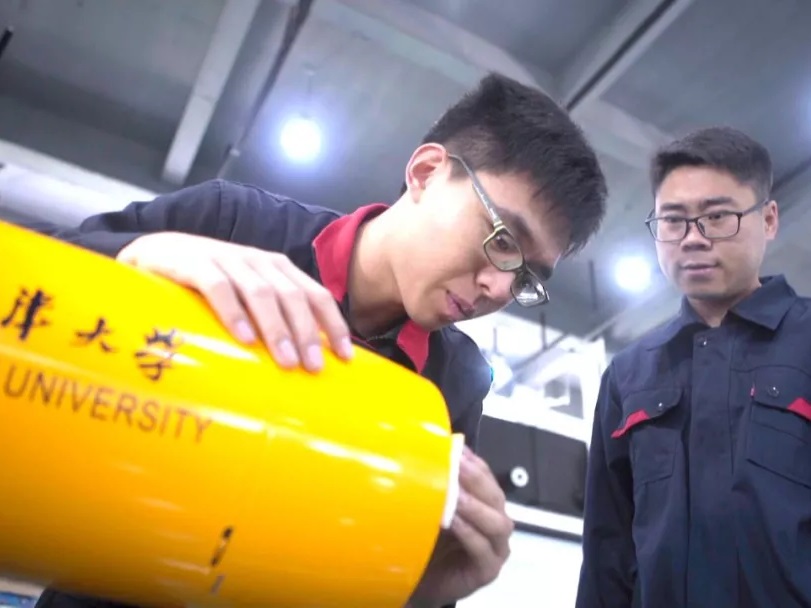China promotes the “Made in China 2025” program with the background of the 4th Industrial Revolution, aiming to develop China as a leading manufacturer in the world. In this context, the concept of “Emerging Engineering Education” was born, and Tianjin University is actively constructing a uniquely Chinese style of a world-class personnel training system embodying the character of Tianjin University, striving to gain experience in Emerging Engineering Education in China and leading Chinese Emerging Engineering Education to the world stage.
Revolution with Insistence on Essence — Developing the Idea of Emerging Engineering Education

In recent years, researchers of Tianjin University have made a number of great achievements in the strategic needs of the country and on the leading edge of the world's science and technology, including Petrel-II with the deepest record of China's Underwater Gliders; the world's largest facility for earthquake engineering simulation led by Tianjin University; Yeast artificial chromosomes have been precisely synthesized and Tiangong II with an in-orbit brain-computer interaction system.
Behind the great achievements in scientific research underlies TJU’s constant efforts in its training of high-quality talented people in science and engineering and in its promotion of the construction of a high-level personnel training system. As the core element of the Excellent Engineers Training Program 2.0 of the Ministry of Education, Emerging Engineering Education plays a leading role in the reform of engineering education in the new era. Starting from 2010 when designed as a first pilot the Excellent Engineers Training Program, to this April when China’s first Emerging Engineering Education Center was established, with the guiding idea of “Emerging Engineering Education”, Tianjin University has been exploring and practicing for 8 years to cultivate outstanding scholars, including establishing the first Emerging Engineering Education Center in China depicting a "road map" for TJU to train excellent engineers of the new era.
Development with the Times—Forming the Structure of Emerging Engineering Education Majors

In September 2018, the first batch of first year students majoring in intelligent medical engineering commenced study at the Weijin Road Campus at Tianjin University. Those students are known as the first batch of medical students in the first modern university in China and at Tianjin University since its 123 years’ foundation. In recent years, the university has implemented the "Double Ten" project, focusing on the construction of 10 emerging engineering majors and the upgrading of 10 traditional engineering majors, to promote the reconstruction of its majors, remodeling of teaching content and upgrading of its teaching level. And it has been persisting in the incremental optimization and active arrangement of "new engineering majors". Geared to industry, the world and the future, Tianjin University has taken the initiative to plan for future personnel training in strategic fields, setting up China’s first undergraduate major of intelligent medical engineering, preparing new majors such as intelligent science and technology and intelligent manufacturing engineering, and establishing a revolutionary academy of chemistry and future technology, the Research Institute of Biomedicine Engineering and Translational Medicine, and a demonstration School of Microelectronics to cultivate scientific and technical personnel in emerging fields. TJU also persists in readjusting the existing elements, meeting the goal "new requirements of engineering", and promoting the renovation and of traditional engineering majors by “upgrading” water resources and hydropower engineering with big data, the Internet of Things and Artificial Intelligence, and putting forth efforts to foster students' abilities in intelligent design, construction and operation. Furthermore, this university has formed an "Engineering Science Experimental Class", aiming to build connections among such majors as mechanical engineering, optics, information technology and computer science, to cultivate outstanding engineering talent with manufacturing engineering ability and scientific discovery capabilities, and to achieve strategic adjustment of its professional structure.
Innovation Integrated into Education—Forming a New Pattern of Engineering Education
In September 2018, the Emerging Engineering Experimental Class of Tianjin University (NXP Class) was set up to provide a new way for the university to explore the training of new engineering talent for the future and the industry in the fields of Artificial Intelligence and Internet of Things through the integration of industry and education and with the cooperation of enterprises. The establishment of Medical College marked the beginning of training new engineering medical professionals with the motto of “led by medical science, supported by engineering, developed by innovation, and improved by clinical demonstration”. Professor Jay Siegel, Dean of the School of Pharmaceutical Science and Technology, one of the first international demonstration schools in China, is the first full-time foreign Dean hired by the university in the past 60 years. In Prof Siegel's view, it is a great opportunity for teaching innovation to work in the School of Pharmaceutical Science and Technology of TJU.
Promoting the integration of industry and education, co-construction and international cooperation, Tianjin University has achieved a thorough combination of education elements. It has established a mechanism of industry-education integration, cooperating with over 40 enterprises to build a new engineering experimental class, a teacher training center, and an Artificial Intelligence platform. The School of Artificial Intelligence was built with the cooperation with Tianjin at the time of the construction of Tianjin harbor based on AI technology. Moreover, the university has established an international training mechanism, jointly setting up the Tianjin International Engineering Institute with universities in France, the United States, Canada and other countries so as to co-establish such majors as intelligent architecture, computer science, electronics and communication engineering. What’s more, it proposed to establish an International League to meet new the challenges of the new industrial revolution.
Creation through Reform—Entering a New Stage of Personnel Training

“Focusing on education, research, practice, innovation and business-startup, Tianjin University has been constructing Emerging Engineering Education, with the stress on localization and internationalization, learning and teaching, practice and innovation. Through eight years of reform, Tianjin University has realized a number of real achievements in education,” said Zhong Denghua, President of Tianjin University and Academician of the Chinese Academy of Engineering.
Tianjin University plans to build a new model of personnel training which contains the whole process from originality and innovation to starting a business. TJU is making efforts to inspire creativity among its students through activities such as the Smart Space Station, the Lakefront Forum, and “the Next 30 Years” creativity contests. In addition, a national experimental teaching demonstration center, a virtual simulation laboratory and an innovation laboratory have been built and in service for all students and faculties. It has been estimated that over the past two years, 8805 undergraduates have entered the laboratory; 179 papers have been published and 126 patents have been approved. In addition, the university has provided public services and technical support for students’ startup projects, relying on a number of regional research institutes and technology transfer centers. A patent analysis laboratory was set up to help student startup teams with transformation, selecting more than 1,000 patents from TJU. As a result, 94 innovative startup teams have been formed, among which 63% were technical and innovative; over 500 students participated in innovative startups, among which 42% were graduate students; and 47 enterprises have been registered, among which 18 have been approved as small and medium enterprises of technology and 23 possess core technologies or patents.
As one of the first nine “New science” program institutions approved by the Ministry of Education, Tianjin University has played a leading role in the area, establishing its International League of Emerging Engineering Education.
By: Cui Jingyue, Du Peiran
Editors: Sun Xiaofang and Ross Colquhoun






